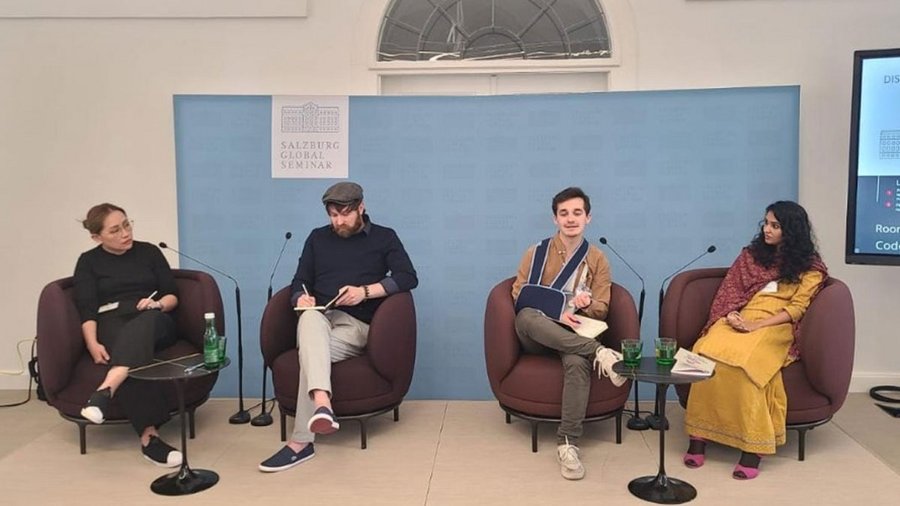A discussion on how to transform education puts people and experiences at the heart of change.
What does it mean to have power? And what does humanity’s relationship with power translate into transforming education systems and ways of thinking? A four-person panel discussion convened on the second day of the Education Futures program to critically reflect on the connections between power, agency, privilege and transformation. Moderated by Vishal Talreja, co-founder of Dream a Dream, the morning session took participants through a space of learning personal experiences and analyses from Hugo Paul, Mavie Ungco, Romana Shaikh and Chris Purifoy.
Romana Talreja opened the panel discussion with a question: “What has been your own personal experience of encountering systemic values in your life?” For Shaikh, being a Muslim woman in India has undeniably influenced her relationship with power, agency and change. “When we talk about systemic injustices, it’s not just something that happens to kids. It’s (systemic injustice) left an impact on me, I’m left dysregulated.
While we talk about the systems outside, I’d like for us to explore the impact it’s had on us on the inside,” she explained. After all, people make up education systems and processes, from policymakers and educators to students, parents, and guardians. Each person brings their own experiences into educational spaces, and these spaces in turn impart experiences to these participants. What would it look like for education to prioritize and value these experiences? What would need to change for every person in the system to have positive experiences, to feel safe, recognized, and appreciated?
For Mavie Ungco, the change all comes down to power and agency. Far from being rigid, the two are fluid, changing with different contexts and settings. Although she grew up poor, she had a home environment that believed in her abilities. This encouraged her sense of agency, but as she moved from secondary school to university, Ungco quickly realized that in order to negotiate being a university student in the Philippines from a poor background, she had to make a few changes.
As she puts it: “I figured out that there was a social capital that I could leverage. I had to speak a certain way. I had to act a certain way. I had to play the game first.” But even then, there was the question of why. Why couldn’t she exist in that space as she was? Why were people of similar backgrounds at a disadvantage in institutions of higher learning? Most importantly, how could she change that?
Using personal experiences to transform the system was a recurring theme for the panelists. It’s certainly the case for Chris Purifoy. Growing up in the American South, he had fewer barriers to access than other panelists, but his family upbringing and education influenced his desire for transformation. “My father tried very hard to pull himself up from his bootstraps. He’s my hero, he worked harder than anyone I know. But he never got ahead,” says Purifoy.
Hard work alone isn’t enough to overcome economic, social, and cultural hurdles: the future of education requires that everyone is on a level playing field and has the same access to resources and opportunities. It’s also vital that different strengths and areas of interest are treated equally. Purifoy was a creative child and creative student who didn’t exactly fit into the traditional professions that his parents wanted him to pursue: “I always followed a non-traditional path. It was only later that I realized it was my superpower.”
As one of the Youth Voices participating in the program, Hugo Paul was the last panelist to present his experiences. It was not an easy or comfortable process for him, but he’s grateful that he was able to reflect how he’s faced fewer systemic barriers and more opportunities. As he explained to the room: “Sometimes in a room, we have more or less power than others. If we want to collaborate effectively with a lot of continents, we have to process our own power and agency. The most important is to make that visible to others.” Changing power dynamics and encouraging agency in education have two sides. What will it take for those with power to relinquish it to those who don’t?
How do we change our relationship to power and agency? How do we learn to claim them, and how do we teach children that they have power and agency in their lives and in the classroom? The conversation between the audience of Salzburg Fellows and the panelists didn’t aim to find concrete answers to these big questions. Rather, the panel presentations and the ensuing Q&A were meant to get all the participants to stop, think and be open to change. That openness is an integral first step in transforming education into a more holistic and nurturing system that values the people and relationships at its core. From understanding the needs of different contexts to encouraging students to pursue different fields and making classrooms safe spaces for people of different backgrounds, the session can form the beginning of a shift in perspectives and focus – a shift of which the effects will be felt long after the program ends.
This article featured in Issue 1 of the Education Futures: Shaping a New Education Story program newsletter. Download the full issue here.


